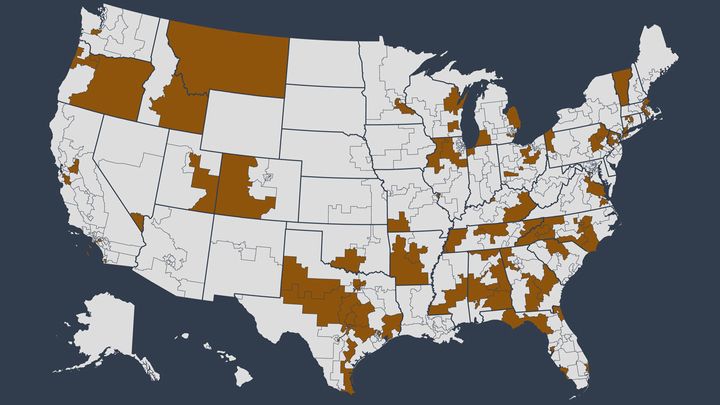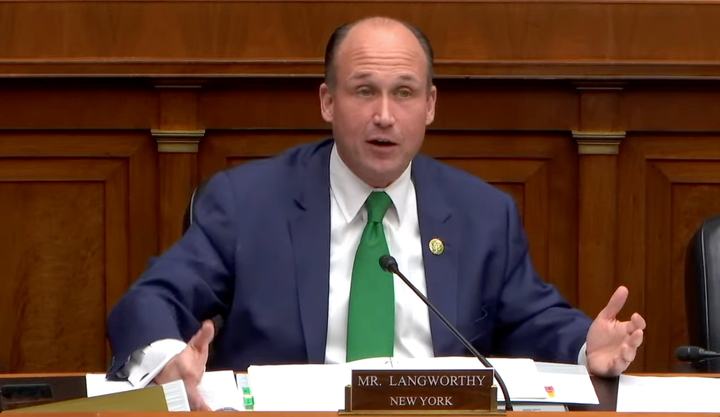At least 100 members of the House of Representatives and their spouses own fossil fuel company stocks or mutual funds despite the conflicts of interest the investments pose for addressing climate change.
Use the interactive map below to see if your representative owns fossil fuel investments and, if so, which companies and funds they are invested in. Sludge’s analysis includes stocks in oil, gas, and coal companies, utilities that burn fossil fuels, and conglomerates like Berkshire Hathaway and General Electric that own subsidiaries in oil and gas or fossil fuel-driven electricity industries. If you don’t know your district, you can check here.
[This is the first time complete data on representatives’ fossil fuel investments has been published. If you appreciate Sludge’s work, please become a member. ]
Key findings:
- Sludge found 50 Democrats and 50 Republicans who own fossil fuel investments, suggesting that Republican House members are more likely to invest in fossil fuels.
- Rep. Michael McCaul (R-Texas), his spouse, and his dependent children, likely have, combined, the most money invested in the fossil fuels industry, with a maximum of over $19 million invested in the stocks of Andarko Petroleum, Devon Energy, Star Gas Partners, and other fossil fuel companies.
- On average, the Republicans invested in the fossil fuel industry have as much as nearly $1.1 million invested each, more than twice as much as the average of the maximum amount the invested Democrats have ($480,000).
- Members of Congress own between $3.5 and $11.5 million worth of ExxonMobil stock, making it likely the fossil fuel company in which Congress is the most heavily invested.
- Rep. John Carter (R-Texas) is likely the largest congressional investor in ExxonMobil, with as much as $5,250,000 invested in the company’s stock. Carter is a member of the Defense Appropriations Subcommittee, which oversees defense contracting. ExxonMobil received $99.7 million in defense contracts over the past 12 months.
- Energy and Commerce Committee Chairman Rep. Frank Pallone’s (D-N.J.) spouse has up to $80,000 invested in the fossil fuel industry, including stock holdings in Chevron and Dominion Energy. The committee oversees national energy policy and environmental protections.
- Rep. Fred Upton (R-Mich.), the ranking member of the Energy Subcommittee of the Energy and Commerce Committee, has up to $523,999 invested in fossil fuel stocks, including stocks in BP, Chevron, and ExxonMobil.
- Two members of the Environment Subcommittee of the Oversight and Reform Committee, which oversees global climate change, are invested in fossil fuel stocks: Rep. Brian Babin (R-Texas), Rep. Bob Gibbs (R-Ohio).
[Related: Facing Climate Crisis, Senators Have Millions Invested in Fossil Fuel Companies]
Observations from the swamp:
- As Rep. Greg Gianforte (R-Mt.) and his spouse hold up to $674,607 in Chevron stock, the oil giant lobbied Congress last year on three pipeline safety bills assigned to the House Energy and Commerce committee, on which Gianforte sits, as well as one pipeline security bill.
- As Rep. Bill Flores (R-Tex.) jointly holds 27 fossil fuel industry investments with his spouse, his former chief of staff, Jeff Morehouse, went through the revolving door in 2017 to lobby for ClearPath Action, part of a “conservative clean energy” nonprofit. The ClearPath Foundation lobbies for expanded use of natural gas and coal.
- As Rep. Paul Mitchell (R-Mich.) and his spouse hold up to $1,250,000 in Berkshire Hathaway, he is a member of the House Committee on Transportation and Infrastructure. The conglomerate lobbied Congress last year regarding eight transportation bills, including one that called for the largest authorization for highway funding in history.
- While retiring Rep. Francis Rooney (R-Fla.) holds up to $3.1 million in fossil fuel companies, he introduced carbon tax proposals similar to approaches favored by the industry.
- Rep. Joe Kennedy’s (D-Mass.) largest fossil fuel investment is up to $1 million in ExxonMobil stock. As he sits on the House Energy and Commerce Committee, ExxonMobil’s $9.75 million in 2019 federal lobbying weighed in on at least nine bills in Congress regarding energy issues.
- Rep. Phil Roe (R-Tenn.) and his spouse’s third-highest fossil fuel investment, after Chevron and an energy industry index fund, is Occidental Petroleum stock worth up to $163,632. In 2019, Occidental disclosed $8.7 million in federal lobbying expenses, including on a bill that would exempt racecars from Obama-era Environmental Protection Agency rules under the Clean Air Act.
- Retiring Rep. Jim Sensenbrenner’s (R-Wis.) largest fossil fuel investment, as he sits on the House Committee on Foreign Affairs, is up to $1 million in ExxonMobil. In 2018, ExxonMobil reported lobbying regarding a bill initially referred to that committee and others that would more effectively guard against national security risks from foreign investments.
- Sensenbrenner also holds up to $250,000 of stock in BP, which lobbied last year on the Protecting Europe’s Energy Security Act. The bill was referred to the two House committees on which Sensenbrenner sits, Foreign Affairs and Judiciary. Enacted in December 2019 as part of the defense spending bill, the legislation sanctioned the Russian-led Nord Stream 2 natural gas pipeline that delivers Russian energy to Germany—sanctions that stood to benefit BP, which plans to invest an additional $6 billion to deliver oil to Western Europe from the Caspian Sea via the separate Southern Energy Corridor.
Methodology: Sludge built a scraper to extract information from the House and Senate financial disclosure portals. Handwritten disclosures were manually reviewed by Sludge reporters. Purchases and sales from 2019 periodic transaction reports with data from annual disclosures for 2018. Sludge used industry classifications from the Open Secrets website, but in some cases the industry categories were altered and companies that are not in CRP’s database were included. The data in this post and visualization are current as of Dec. 13.
One more thing! This data visualization took hundreds of hours to produce, but we believe it’s worth the time it takes to do this kind of data-driven reporting so that important sources of possible corruption, like these fossil fuel investments, do not go unknown and unchallenged. No other outlet is publishing this kind of information about congressional conflicts of interest, so if you value what we’re doing, please consider becoming a member for $5 a month. Sludge has no ads and no major foundation donors, so we rely on our members to make out reporting possible.



